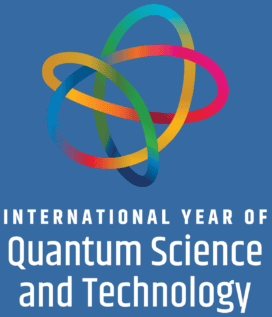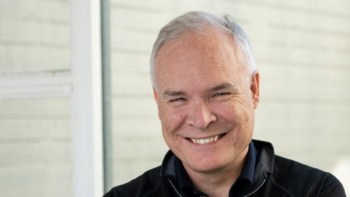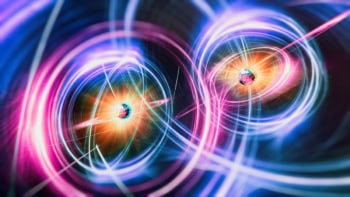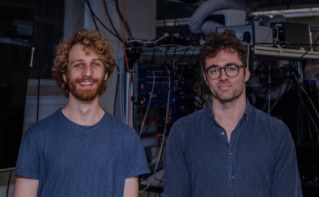
Part of our International Year of Quantum Science and Technology coverage
After attending the Helgoland 2025 meeting in June celebrating 100 years of quantum mechanics, Gino Elia leaves with concerns about the culture of science
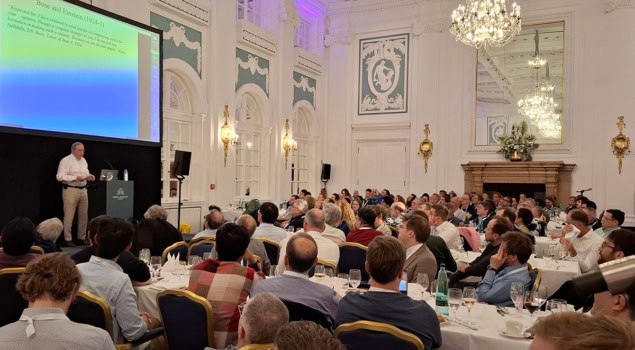
Hundreds of physicists gathered on the island of Helgoland in June to celebrate the centennial anniversary of the invention of quantum mechanics by the physicist Werner Heisenberg. The event – Helgoland 2025 – is a centrepiece of the International Year of Quantum Science and Technology and it drew 300 quantum physicists with plenary talks and panel discussions ranging from philosophical puzzles like Wigner’s friend to state-of-the-art experiments in quantum computing.
In 1925 Heisenberg travelled to the island, off the coast of Germany, to recover from hay fever. While there he put together a mathematical framework for quantum mechanics that gave up the “visualizability” of quantum phenomena and strictly focused on “observables”. Heisenberg’s mythical stay on Helgoland is traditionally celebrated as the birth of quantum mechanics.
I attended the event as a philosopher of science with a background in quantum mechanics, and I was keen to learn more about participants’ views about the relationship between philosophy and physics. Quantum information theory lives at the intersection of philosophy and physics, as the field has been one of the primary drivers of renewed progress in the philosophy of quantum mechanics and its interpretations.
Renowned for being the financial powerhouse of quantum computing, quantum-information theory is flush with funding for building computers promising “quantum advantage”. Isaac Chuang from Massachusetts Institute of Technology bluntly told the audience that these computers currently do not serve any important economic function. The theory behind the boom in quantum computing has been equally important for philosophers and physicists looking for a compelling list of axioms from quantum mechanics, akin to Einstein’s postulates for relativity.
Like most scientific pursuits, quantum information did not begin with practical ends in mind, but with honest questions about nature. In the 1990s it was closer to foundational issues about the meaning of quantum mechanics. The growth of this philosophical-physical discipline called “quantum foundations”, while not a moneymaker, has made the field more introspective about concepts in desperate need of elucidation. Terms such as measurement, superposition, nonlocality and the metaphysics of quantum states are hotly debated in the community.
As has happened multiple times, Nobel laureates Alain Aspect and Anton Zeilinger sparred at Helgoland over the ontology of quantum states. Zeilinger defended the viewpoint that quantum states are states of knowledge, while Aspect defended nonlocality on pragmatic grounds. When Markus Aspelmeyer from the University of Vienna finished his talk on looking for gravitationally induced entanglement, he was asked what this phenomenon could mean if quantum states are only knowledge.
None of the talks attempted to fix a consensus about foundational questions. As the British philosopher Ludwig Wittgenstein wrote in his 1969 book On Certainty, “At the foundation of well-founded belief lies belief that is not founded.” Talks by Christopher Fuchs from the University of Massachusetts Boston and Robert Spekkens from the Perimeter Institute for Theoretical Physics in Canada underscored that we must be willing to dissect the theory to find what makes quantum mechanics truly quantum, and this will reveal what is special about nature. This patience for not jumping the gun on quantum ontology has paid off.
Spekkens showed that many phenomena taken to be uniquely quantum – the uncertainty relations, interference and wave–particle duality – are not the root of the mystery and can be accounted for classically. He referred to remaining phenomena as the “thin film” of quantum mechanics, such as Bell inequality violations, that cannot be accounted for in any classical theory. The pedagogical strategy of making quantum theory look as classical as possible was picked up in a panel discussion on the last day. The panellists suggested that physics educators not sensationalize the theory and use the most intuitive, “classical” reasoning available.
While at Helgoland, I had a discussion with philosopher Elise Crull from City College of New York and IBM quantum physicist Charles Bennett about the philosophy of science. Crull said how physics and philosophy can support each other, as physics was once a branch of natural philosophy. In fact, in her classes, Crull says she shows students how philosophically engaged the pioneers of quantum mechanics were – for example, how Bohr and Einstein were broadly familiar with Kantian philosophy.
Bennett, meanwhile, told the story of how he built up the field of quantum information theory by calculating the amount of energy necessary for computing with a quantum bit. He emphasized that one of a scientist’s great virtues is the joy of being wrong. We do not have to back down from the truth and we can also believe it is important to humanize others. If we can admit that we’re wrong, then non-scientists can too.
Renewed hope
Moral concerns surrounding the culture of science surfaced throughout the conference. It was lost on no-one, for instance, that the vast majority of participants at the conference were men. Crull made this explicit during the opening banquet, when she flashed a slide that slowly populated with the overlooked or outright forgotten voices of women in the invention of quantum mechanics. The slide was completely full by the end. The organization Diversity in Quantum noted that it is examining workplace diversity in quantum sciences and quantum technologies.
Through the celebration, the gravity of our current political environment crept into the otherwise momentous gathering. The invention of quantum mechanics converged with arguably the darkest moment in human history. Among its many moral atrocities, the political ascent of Nazism fractured the intellectual centres of Europe and severely damaged the reputation of German science. The conference saw numerous participants cite the importance of international collaboration and inclusivity in their talks. During the closing remarks of the conference, Časlav Brukner, who is scientific director of the Institute for Quantum Optics and Quantum Information in Vienna, told the crowd, “Love is wise. Hatred is foolish.”

I felt refreshed by the air of solidarity among participants after months of Donald Trump’s cartoonish vitriol towards education and academic freedom. However, I worry that scientists are still too confident that the acceptance of scientific truth is inevitable, as if the status quo will be easily restored in a few years. I have taught physics classes in rural areas where a distrust in scientific institutions resonated with my students, who openly doubted not only the science of evolution and climate change, but also the seemingly exotic features of relativity, or whether human beings landed on the Moon.
I often found that explaining the facts does not change students’ minds because the entire enterprise of science, the meaningfulness of scientific inquiry, often strikes non-scientists as alien and disconnected from the context in which they live. As suggested by Wittgenstein, many of our core beliefs go unexamined and end up in a blind spot. It is difficult to know what our common ground really is, but without it, facts are not salient to us.
Helgoland: leading scientists reflect on 100 years of quantum physics and look to the future
They do not look like “facts” at all without a significant amount of education and preparation, not just in terms of technical background but also the culture of scientific inquiry. We require training and acculturation to know how a piece of information is supposed to count as “evidence” for a conclusion. Nothing inevitable follows from the possession or dissemination of facts. It takes a community of peers, not just experts, to recontextualize the facts in terms of our common ground.
I left the conference with renewed hope that quantum physics is thriving but also concerned that scientists are in for a long fight to depoliticize factual information. It is essential that this fight humanizes those who disagree with us as much as it draws a line in the sand against the spreading of falsehoods. Science is not really the default setting for how humans think about the world. As many historians of science point out, a belief in the possibility of science at all, over all its competitors in the history of the world, is quite extraordinary.
This article forms part of Physics World‘s contribution to the 2025 International Year of Quantum Science and Technology (IYQ), which aims to raise global awareness of quantum physics and its applications.
Stayed tuned to Physics World and our international partners throughout the year for more coverage of the IYQ.
Find out more on our quantum channel.

